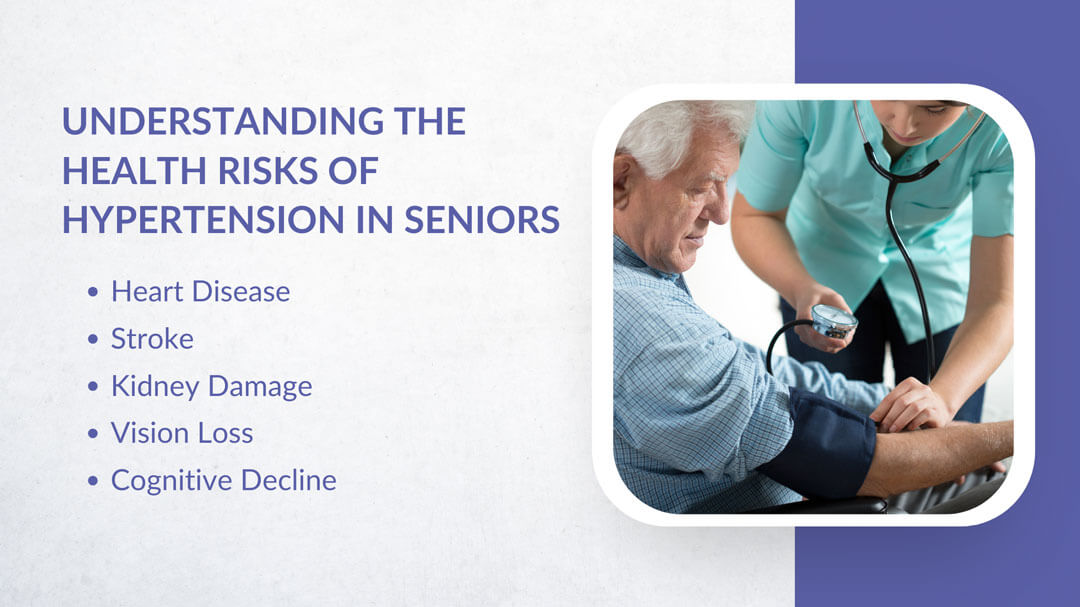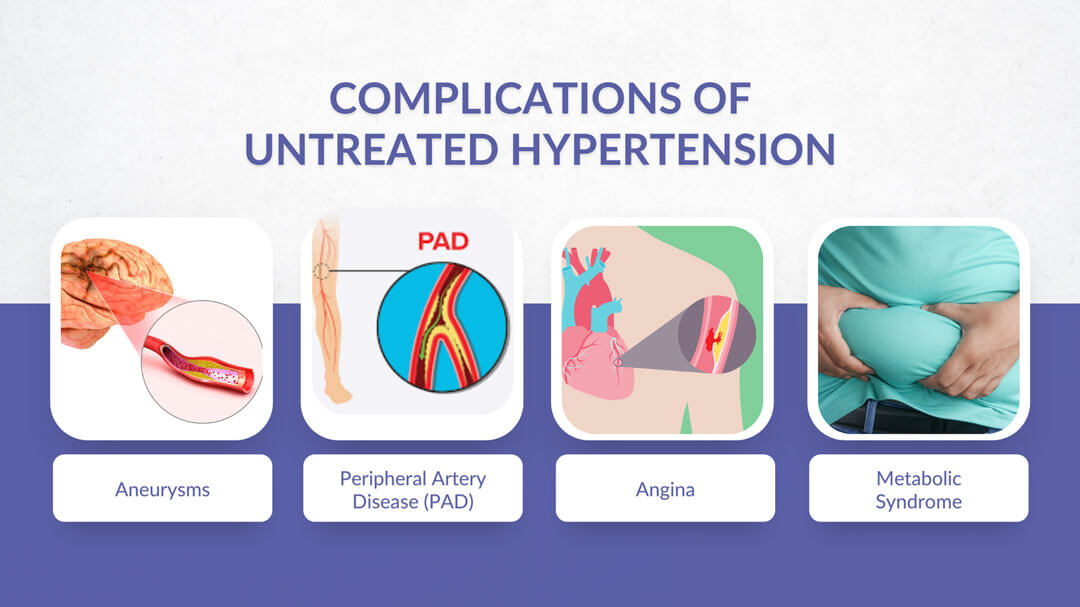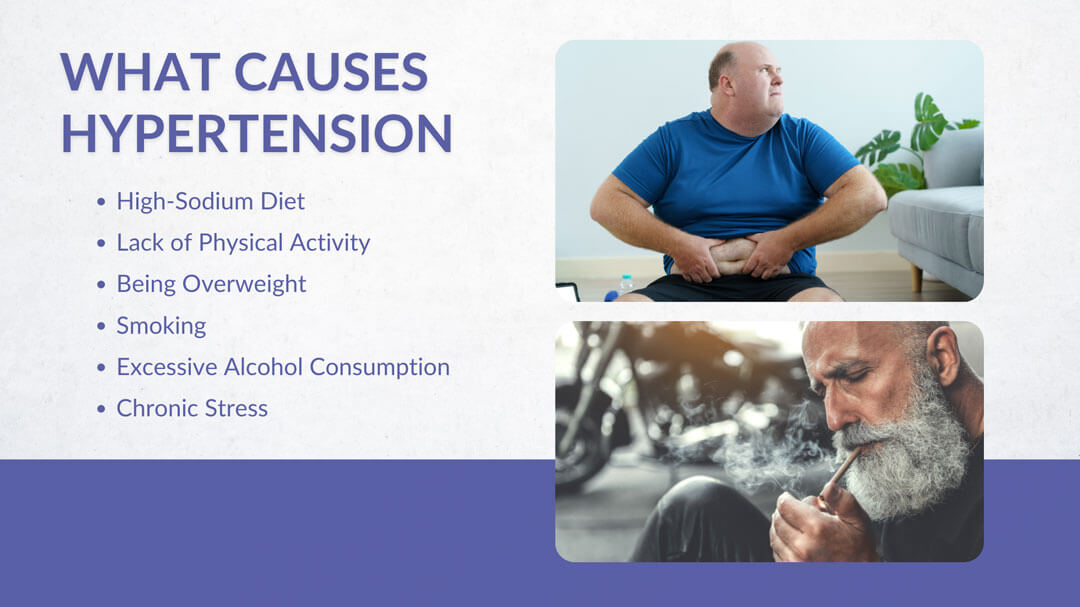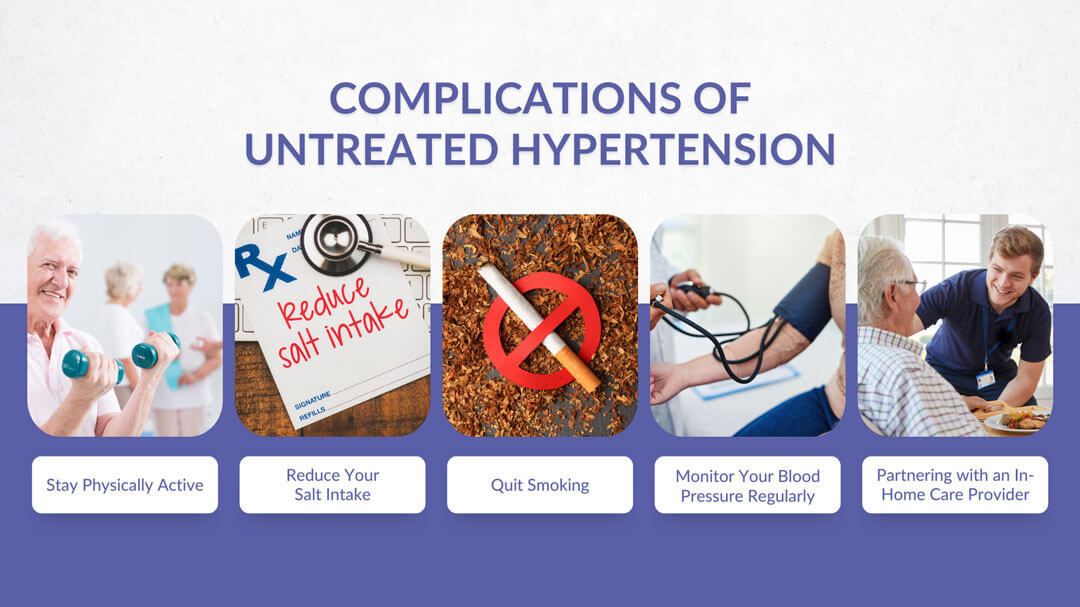Heart Health: Tips for Managing Hypertension

Your heart is crucial to your overall health, especially as you age. One significant threat to heart health is high blood pressure, also known as hypertension. High blood pressure means your blood exerts too much force against your blood vessels, which can damage your arteries over time. This can lead to serious health issues like heart attacks, strokes, heart disease, kidney problems, and even vision loss.
Many seniors are unaware they have high blood pressure since it often has no noticeable symptoms. Regular blood pressure checks are essential for diagnosis. Consistently high readings, precisely 130/80 or above, indicate hypertension. While medication can help manage blood pressure, lifestyle changes are equally important in keeping it under control.
Table of Contents
Understanding the Health Risks of Hypertension in Seniors

Hypertension poses significant health risks, especially for seniors. Here are some of the critical dangers associated with high blood pressure in older adults:
Heart Disease
Hypertension can cause the arteries to harden and thicken, leading to heart disease or heart failure. The increased workload on the heart can result in an enlarged heart, which may struggle to supply the body with sufficient blood.
Stroke
High blood pressure can cause blood vessels in the brain to burst or become blocked, leading to a stroke. This can result in long-term disability or even death.
Kidney Damage
The kidneys filter waste from the blood, but high blood pressure can damage the blood vessels in the kidneys, impairing their function. This can lead to chronic kidney disease or kidney failure.
Vision Loss
Hypertension can damage the blood vessels in the eyes, leading to vision problems or blindness. This condition, known as hypertensive retinopathy, can progress without warning.
Cognitive Decline
There is evidence that high blood pressure contributes to cognitive decline and the development of dementia in seniors. This can significantly impact daily life and overall well-being.
Recognizing these risks underscores the importance of managing hypertension through lifestyle changes and medical intervention.
Why Seniors Are More Susceptible
As we age, our blood vessels naturally become less elastic, making it more challenging for the heart to pump blood efficiently. This age-related stiffening of the arteries can increase blood pressure. Additionally, seniors are more likely to accumulate risk factors for hypertension over their lifetime, such as poor dietary habits, physical inactivity, and the long-term effects of stress. Medications for other conditions can also contribute to higher blood pressure.
Complications of Untreated Hypertension

Untreated hypertension in seniors can have severe and far-reaching consequences. The silent nature of high blood pressure means that many individuals may not realize they have it until they experience a severe health event. Here are some complications that can arise if hypertension is not effectively managed:
Untreated hypertension in seniors can have severe and far-reaching consequences. The silent nature of high blood pressure means that many individuals may not realize they have it until they experience a severe health event. Here are some complications that can arise if hypertension is not effectively managed:
Aneurysms
High blood pressure can weaken the walls of your arteries, leading to aneurysms. These bulges in the arterial wall can rupture, causing life-threatening internal bleeding.
Peripheral Artery Disease (PAD)
Hypertension can lead to the narrowing of the arteries in your limbs, causing pain and mobility issues. PAD can also increase the risk of infection and slow the healing of injuries in your extremities.
Angina
High blood pressure can cause the coronary arteries to narrow or block, leading to angina. This condition is characterized by severe chest pain due to reduced blood flow to the heart muscle.
Metabolic Syndrome
Hypertension is often part of a cluster of conditions known as metabolic syndrome, which includes high blood sugar, excess body fat around the waist, and abnormal cholesterol levels. Together, these conditions significantly increase the risk of heart disease, stroke, and diabetes.
What Causes Hypertension?

Hypertension occurs when the force of blood against artery walls is consistently too high. Several factors contribute to this condition, including a high-sodium diet, lack of physical activity, being overweight, smoking, excessive alcohol consumption, and chronic stress. Genetics and age also play a role. By understanding these causes, you can take proactive steps to manage your blood pressure effectively.
It’s crucial to monitor your blood pressure throughout the day to see if it remains high or stays within your target range. Record what you’re doing when you check it, whether you’ve been exercising, sleeping, or feeling stressed. Tracking these trends can help determine if your lifestyle changes are effective. Share these notes with your doctor for better guidance.
Practical Tips for Managing High Blood Pressure

Incorporating specific lifestyle changes into your daily routine can significantly improve your health and help manage hypertension. Here are some practical tips to keep your blood pressure in check:
Stay Physically Active
Aim for at least 30 minutes of moderate activity five days a week. Diversify your exercises to keep things interesting and enjoyable. Walking, jogging with friends, biking, swimming, joining a dance class, or participating in a senior fitness program are all excellent options. Combine cardio and strength training to keep your body moving and fit.
Regular exercise also aids in weight management, which is crucial for reducing high blood pressure. Even losing a few pounds can lessen the strain on your heart and blood vessels. Consult your doctor for personalized exercise and weight management recommendations.
Reduce Your Salt Intake
Excessive salt consumption can significantly contribute to high blood pressure. Aim to keep your sodium intake around 1,500 mg or less per day. Be vigilant about reading food labels and serving sizes. Processed and packaged foods generally have higher sodium levels than fresh ones. Opt for canned products labeled “no salt added,” “unsalted,” or “low sodium.”
Adopt a well-balanced diet rich in fresh or flash-frozen fruits and vegetables, lean meats, and whole grains. Instead of salt, use herbs, spices, and other salt-free seasonings to flavor your meals.
Quit Smoking
Quitting smoking can be tricky, but it’s immensely beneficial for your health. Nicotine constricts your blood vessels, reducing blood flow and making your heart work harder. It also increases the risk of plaque buildup in your arteries. Combined with high blood pressure, this significantly raises your risk of stroke or heart attack.
Monitor Your Blood Pressure Regularly
Check your blood pressure periodically throughout the day to see if it remains high or stays within your target range. Note your activities during these checks, such as exercising, sleeping, or feeling stressed. Tracking these trends can help you see if your lifestyle changes are making a difference. Share your findings with your doctor for better management.
Partnering with an In-Home Care Provider
An in-home care provider can significantly help you manage your heart health. They can remind you to take your blood pressure medication, assist in creating and preparing a low-sodium diet, and encourage regular physical activity. Additionally, having a caregiver provides companionship and support as you navigate these lifestyle changes. Contact Always Best Care of Nashville at (615) 678-0293 to learn more and schedule your free consultation.





